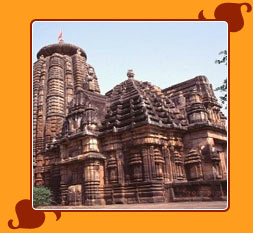The modern capital of Orissa, and the "Temple
Metropolis of India" can still boast of 500 temples. Of these about a
dozen are architecturally very interesting. There was a time when
Bhubaneswar had over 7,000 such shrines.

These
temples epitomize a comprehensive history of the Orissan style of temple
architecture from its very inception to perfection spreading almost to two
thousand years from 3rd century B. C. to 16th Century A. D. These
magnificent monuments dominating the city skyline, are within a reasonable
walking distance from one another. The 46 metre high Lingaraj Temple marks
the culmination of temple tradition of Bhubaneswar
Art
& CultureLingaraj TempleThis most magnificent
monument is also the loftiest. It dates back to the 11th century and
represents the mature and complex 'Nagara' style of Orissan temple
architecture. Its tower, dominating the surroundings, is visible from miles
around. The temple, set in a huge walled compound measuring 520 feet by 465
feet, originally consisted only of the sanctum and the mandap or the
entrance hall. The dancing hall and the hall of offerings are later
additions.
Around the main shrine there are many smaller votive
shrines. The outer walls of the temple are lavishly decorated with beautiful
sculptures which mark a climax of Hindu decorative architecture. Birds,
beasts, creepers, flowers, men and women in erotic poses and postures, a
host of gods and goddesses all are there in their full majesty and grandeur.
The inner walls of the shrine, containing the phallus symbol of Shiva, are
plain and without any embellishment. Just north of this temple is the sacred
lake of Bindu Sagar with a tiny island in the centre, where there are many
lesser shrines. Here, once in a year, Lingaraj himself is brought for ritual
ablutions.
Rajarani Temple This temple with its
sculptural excellence, profuse decoration and wonderful proportions, is a
unique example of Orissan temple art. The erotic mithuna figures,
fascinating nayikas, nymphs and gaja-simhas, all are there in great details.
Its plain but majestic jagmohan (mondap) presents a great contrast to its
lavishly decorated main shrine. Other temples worth a visit include
Luxmaneswar, Satrughaneswar and Bharteswar (6th century A. D.),
Parsurameswar and Swarna Jaleswar (7th century), Vaital (8th century),
Mukteswar (10th century), Brahmeswar (11th Century) and Anant Basudeva (13th
century).
Museums Bhubaneswar also has three very
interesting museums. The Orissan State Museum is centrally located and has a
rich collection of sculptures, coins, copper plates, armory objects, rare
palm leaf manuscripts, lithic and bronze age implements, paintings,
traditional folk and musical instruments and other art objects. The
Handicrafts Museum on the Secretariat Road houses a good collection of
Orissan handicrafts.The Tribal Research Museum is another interesting place.
How
to reach thereBy Air :- Indian Airlines and many private
airlines fly on regular basis to Bhubaneswar. Bhubaneswar Airport is 3 km
from the city centre and almost all the major cities are connected from
here. Indian Airlines has flights to Delhi, Mumbai, Kolkotta, Delhi,
Hyderabad, Visakhapatnam and Varanasi.
By Rail :- Bhubaneswar
also have good railway network connecting it to major cities of India
Kolkatta, Puri, Bhubaneswar, Delhi, Mumbai, Hyderabad and Tirupati.
By
Road :- The national highway no.5 touches this capital city. The main
bus stand is at Barmunda, 8 km from the city centre. There are regular
interstate bus services from the nearby towns and cities. Inter-state bus
services operate daily in between Calcutta and Puri via Bhubaneswar and
Bhubaneswar-Tata Nagar.






 These
temples epitomize a comprehensive history of the Orissan style of temple
architecture from its very inception to perfection spreading almost to two
thousand years from 3rd century B. C. to 16th Century A. D. These
magnificent monuments dominating the city skyline, are within a reasonable
walking distance from one another. The 46 metre high Lingaraj Temple marks
the culmination of temple tradition of Bhubaneswar
These
temples epitomize a comprehensive history of the Orissan style of temple
architecture from its very inception to perfection spreading almost to two
thousand years from 3rd century B. C. to 16th Century A. D. These
magnificent monuments dominating the city skyline, are within a reasonable
walking distance from one another. The 46 metre high Lingaraj Temple marks
the culmination of temple tradition of Bhubaneswar